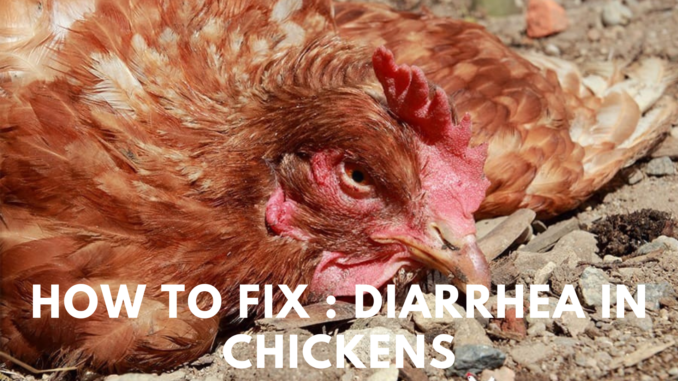
Chicken Diarrhea
Dealing with diarrhea in chickens can be a challenging experience for poultry keepers. This common issue can affect chickens of all ages and may be caused by various factors, from diet changes to infections. Addressing the problem swiftly is crucial to preventing further health complications and ensuring your flock remains healthy.
Importance of Addressing Diarrhea Quickly
Timely intervention is vital when chickens have diarrhea. If left untreated, diarrhea can lead to severe dehydration, malnutrition, and even death. Understanding the causes and implementing the right treatment can help restore your chicken’s health and prevent future occurrences.
Common Causes of Diarrhea in Chickens
Several factors can contribute to diarrhea in chickens. These include:
- Dietary Changes: Abrupt changes in diet can disrupt a chicken’s digestive system.
- Infections: Bacterial, viral, or parasitic infections can cause diarrhea.
- Environmental Factors: Poor sanitation and extreme weather conditions can affect digestive health.
- Toxins: Exposure to harmful substances or contaminated feed can lead to gastrointestinal issues.
Symptoms and Signs to Watch For
Recognizing the signs of diarrhea is essential for effective treatment. Symptoms may include:
- Watery or Loose Droppings: The primary sign of diarrhea is an abnormal consistency in the droppings.
- Decreased Appetite: Chickens with diarrhea may eat less or refuse food.
- Lethargy: Affected chickens may appear weak or tired.
- Changes in Behavior: Look for any unusual behavior or changes in activity levels.
Immediate Actions to Take
Before treating your chicken, evaluate its environment for potential causes of diarrhea. Check for:
- Cleanliness: Ensure that the coop is clean and free from fecal contamination.
- Ventilation: Proper ventilation helps prevent moisture buildup, which can lead to infections.
- Feed Quality: Verify that the feed is fresh and not contaminated.
Isolating the Affected Chicken
To prevent the spread of potential infections, isolate the affected chicken from the rest of the flock. This will help manage the situation and allow you to monitor the chicken closely.
Providing a Balanced Diet
Adjusting your chicken’s diet can aid in recovery. Offer:
- Plain, Unseasoned Foods: Simple, easily digestible foods like boiled rice or plain yogurt can help soothe the digestive tract.
- Probiotics: Adding probiotics to the diet can help restore healthy gut flora.
Foods to Avoid During Diarrhea
Certain foods should be avoided to prevent worsening the condition:
- Greasy or Fatty Foods: These can further upset the digestive system.
- Highly Processed Foods: Stick to natural, unprocessed options.
Importance of Maintaining Hydration
Diarrhea can lead to rapid dehydration, so ensuring adequate hydration is crucial. Provide clean, fresh water at all times.
Electrolyte Solutions and How to Use Them
Electrolyte solutions can help replenish lost fluids and minerals. You can purchase commercial electrolyte powders or make your own at home. Follow the instructions on the packaging or consult a vet for the correct dosage.
Medications and Treatments
For cases caused by bacterial infections, over-the-counter medications like antibiotics might be necessary. Consult with a poultry expert to choose the right medication and dosage.
Natural Remedies
Several natural remedies can support recovery:
- Apple Cider Vinegar: Adding a small amount to the water can help balance gut pH.
- Garlic: Garlic has natural antibacterial properties and can be included in the diet.
Maintaining Clean Living Conditions
Good sanitation is key to preventing diarrhea. Regularly clean the coop, change bedding, and ensure proper waste management.
Regular Health Check-Ups
Routine health checks can help detect and address issues before they become serious problems. Schedule regular vet visits and monitor your chickens for any signs of illness.
If diarrhea persists for more than a few days, or if you notice severe symptoms such as blood in the droppings or significant weight loss, seek veterinary help immediately.
Real-Life Examples of Successful Treatment
Many poultry keepers have successfully managed diarrhea by combining proper diet, hydration, and medications. Sharing these success stories can offer valuable insights and hope to others facing similar challenges.
Advancements in Poultry Health
Ongoing research and advancements in veterinary science are continuously improving poultry health management. Stay informed about new treatments and preventative measures.
Emerging Treatments and Research
New treatments and innovative solutions are being developed to address poultry health issues more effectively. Keeping up with the latest research can help you stay ahead in maintaining your flock’s health.
Conclusion
Diarrhea in chickens can stem from various causes, including dietary changes, infections, and environmental factors. Prompt action, including dietary adjustments, hydration, and appropriate treatments, is essential for effective management. Regular health checks and maintaining clean conditions can prevent future episodes.
Recommondation
Addressing diarrhea quickly and effectively is crucial for your chicken’s well-being. By following these guidelines and seeking expert advice when necessary, you can ensure your flock remains healthy and thriving.
FAQs
1. How can I tell if my chicken has diarrhea?
Look for watery or loose droppings, decreased appetite, lethargy, and changes in behavior.
2. What should I feed a chicken with diarrhea?
Offer simple, easily digestible foods like boiled rice and plain yogurt. Avoid greasy or processed foods.
3. How can I keep my chickens hydrated during diarrhea?
Provide clean, fresh water at all times. Use electrolyte solutions if needed to replenish lost fluids and minerals.
4. When should I seek veterinary help for my chicken?
Seek help if diarrhea persists for more than a few days or if severe symptoms like blood in the droppings occur.
5. What are some natural remedies for chicken diarrhea?
Natural remedies include apple cider vinegar and garlic, which can support gut health and balance.
Leave a Reply